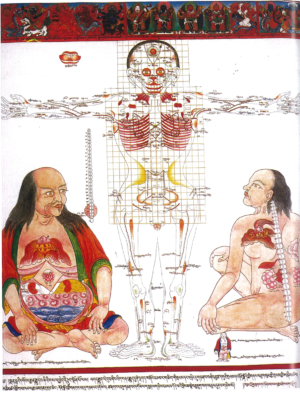Over the last thousand years, Tibetan medicine has generated significant knowledge on people’s responses to contemplative practices such as meditation as well as patterns for emotional and physical wellness. This study seeks to build upon such knowledge through examining well-being data and microbiome measures on a variety of people with varying levels of meditation training who have participated in previous intervention studies to gain a better understanding of what works for whom and why.

Tibetan medicine has cultivated clinically-focused knowledge around tracking individual differences related to cognitive-affective patterns and their contingent contexts that impact health and illness in body and mind across the life course. In particular, Tibetan medicine places specific attention on the role contemplative practice types play as skillful antidotes to afflictive conditions and habits, as well as consequent health outcomes.
This study will employ a Tibetan medical theory-derived assessment of cognitive-affective and physiological constitutions called rangzhin for participants (considered individually unique) and provides a measure for predicted response to three types of contemplative practices: mindfulness, compassion/loving-kindness, and decentering/dereification.
Since metabolic characteristics are a defining feature of constitutions in Tibetan medicine, this study integrates gut microbiome assessments of participants as an added biological indicator of rangzhin.
This study aims to:
- assess whether participants’ individualized constitutions predict their differentiated responses to contemplative practice types (e.g., compassion vs. dereification); and
- assess whether specific biological indicators and cognitive-affective measures correlate to major constitutional categories. Akin to precision medicine, this study aims to inform a nascent “precision contemplative medicine” to support individuals in accessing practices that address their specific needs.
By beginning to re-contextualize practices in the theoretical frameworks of the knowledge traditions from which they came, this project is poised to further our understanding of the very constructs of mindfulness, compassion/loving-kindness and decentering/dereification. In doing this, we hope to understand the constructs better by seeing whom these practices benefit and how and why as well as reach into the richness of thousands of years of experience to help understand more of the mechanics of how these practices benefit individuals.
This work is led by Tawni Tidwell and supported by the Mind & Life Institute Varela Grant.

People Working on This Study







